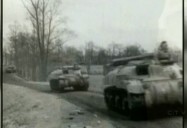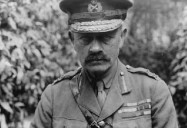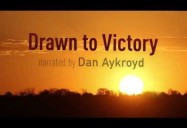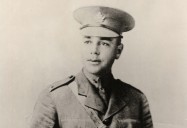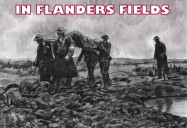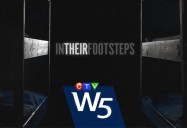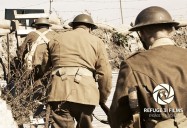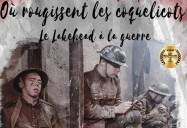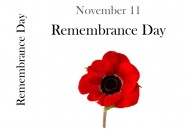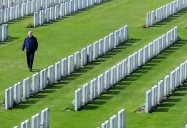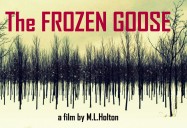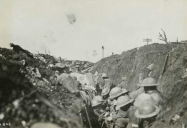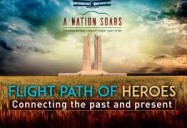
- Waterloo Catholic D S B Streaming Playlist
- WCDSB - After the Last River Playlist
- WCDSB - Remembrance Day Playlist
WCDSB - Remembrance Day Playlist
That Never Happened (52 Minute Version)
Width Height
Grade Level: 9 - 12, Post Secondary
THAT NEVER HAPPENED reveals the story of Canada's first national internment operations between 1914 - 1920, when over 88,000 people were forced to register and more than 8,500 were wrongfully imprisoned in internment camps across Canada, not for anything they had done but because of where they came from.
In 1954, the public records were destroyed and in the 1980s a few brave men and women began working to reclaim this chapter in history and ensure future generations would know about it. They uncovered the stories of the Croatian, Serb, Turk, Armenian and Ukrainian civilians who had been welcomed as settlers, but who were interned after the outbreak of World War I in "concentration camps". The 1914 War Measures Act was the first formal suspension of civil liberties in Canada. Descendents of these innocent internees find it hard to believe what their ancestors experienced, and destruction of records in the National Archives have made research much more difficult. The Ukrainian Canadian community led the campaign for recognition of the losses and injustices during this time, and to ensure that this part of Canadian history will be remembered in a meaningful way.
Please click here for the 78 Minute version of this program.
|
Running Time: 52:05 Country of Origin: Canada Captions: |
Producer: Indiecan Entertainment Inc. Copyright Date: 2017 Language: English |
Video Chapters
-
That Never Happened (52 Minute Version) 52:05
THAT NEVER HAPPENED reveals the story of Canada's first national...
TRANSCRIPT
Close- [MUSIC PLAYING]
- [WATER TRICKLING]
- [BIRD CHIRPING]
- [MUSIC PLAYING]
- Macdonald wrote to the prime minister in July of 1919 as follows. "Fear. Fear is the only agency that can be successfully employed to keep the enemy aliens within the law. And I have no doubt that if the dominion government persists in the course that it is now adopting, then the foreign element here will soon be as gentle, as easily controlled as a lot of sheep."
- [MOTOR PUTTERING]
- [BIRDS CHIRPING]
- [WATER TRICKLING]
- It's hard to believe that this beautiful area held men against their will.
- There is that barbed wire disease, and I think it would be a very difficult thing for anybody to be stuck in that situation and not have some play on, how long is this going to be?
- Why did they intern families and children? These were innocent people. They didn't do anything wrong. Why did it happen to them, that changed everybody's lives? This idea of not talking about things in families, it's that shame. No, they didn't do anything wrong, but they felt like they did. And they were treated like they had done something wrong. This crippling legacy, I still see it today.
- Many, many people probably went to the graves, not telling their family that they were interned.
- When you step foot in this cemetery, you realize there's a bigger story. Historians have mined the archives, and there isn't a lot of new information that we're going to find. I think coming in as an archeologist, we can excavate, and look at the material record, and look at a number of things. By looking into the material culture record, we can actually tell a different side of the story, and look at it from a minority group, and tell it from their perspective.
- We decided to use a ground-penetrating radar for determining what's beneath the surface. And in doing so, we have noted 20 probable burials in this cemetery. Seven of them are clustered around the POW graves while the remaining 13 seem to be a little bit more in the northeastern end of the cemetery. These particular graves are fascinating to me, because they are just talking to the fact that these prisoners were not military POWs. They were civilians and they should not have been here.
- The prisoners themselves probably dug the hole for their comrades that went into those graves.
- When you read through the archives or when history is spoken about, we're never telling the side of the minority groups that we're here. We're not speaking about the oppressed groups. And this is giving voice to these individuals who have been essentially forgotten about.
- The honorable member for Dauphin to end the debate.
- Thank you, Madam Speaker. And during the First World War between 1914 and 1920, well, over 5,000 Ukrainian Canadians were interned, basically put in prison camps. That's another word. "Internment" is kind of a kind word for "prison camp." And that over 80,000 Ukrainian Canadians were asked to register like common criminals and report monthly to the police.
- That's almost unbelievable that an event of this nature would have happened in this country, a country that promotes freedom, promotes freedom of speech, promotes democracy. And yet we treat our pioneers of Ukrainian descent in that manner. It's shameful. And that's why their story has to be told.
- This excerpt is taken from the archive. It's called The Cow-Great Herald and the Settlement of the Ukrainians of Canada. "We are prepared to offer a hearty welcome to men of races and all creeds-- English, Irish, Scotch, French, German, Norwegian, Icelander, Catholic, Protestant, Lutheran, or [INAUDIBLE]. Settlements of separate nationalities may not be ideal settlement at first, but we must trust to time to bring about a fusion of races. All we should ask in regard to immigrants and settlers is, are they healthy, industrious, and moral living? If they fill the bill, they will be received with open hands and open hearts, while difficult." The Daily Herald of Calgary, January 21, 1892.
- There was an entire prehistory of hostility towards Ukrainian immigrants in Canada. These people had come to Canada on the invitation of the Canadian government. They had come as stalwart settlers who were able to open up the Western frontiers of Canada.
- Just prior to the First World War, there was a recession. And the recession resulted in a lot of job loss. And so these people that were invited to Canada to be laborers, to be farmers, some of them lost their jobs. When World War I broke out, they were welcomed immigrants and some naturalized citizens-- they became enemies of the state.
- On this invitation says that there's 160 acres available for every settler. That would have enticed anybody if somebody promised me that. They said there was 200 million acres available. That's a pretty big statement.
- As a 19-year-old Canadian, I was deeply moved by the fact that immigrants who had come to Canada in good faith were treated poorly. They were distrusted, they were treated in a very bad way-- in some cases, with extremely detrimental consequences. My sole purpose was to try to put a human face on that history, to say that, indeed, these were individuals, human beings who came to Canada in good faith, and deserved better than what they received in the end.
- The War Measures Act was promulgated on August 22 in 1914, 18 days after Canada entered the war.
- One can come to the conclusion that there was a clear intention in terms of dealing with enemy aliens, given the timing of the passing of the War Measures Act.
- There were about 88,000 civilians that had to report to the local authorities, and that could be the local police, the local Northwest mounted police.
- The registration system was set up, because there were so many new immigrants, or families like mine that were naturalized but they were farmers out on the prairies. They obviously didn't have enough of a system set up to intern over 80,000 people. And they needed the grain off the farms. They needed the farmers to be farming. So their method was registering these people, and keeping track of their whereabouts by these registration cards, and having the local authorities making sure that they were documented and monitored.
- I've heard stories from others where officials demanded monetary payment to get their document stamped.
- And if they didn't have the money, then they would intern them.
- Where did farmers have the money to pay a monthly bribe if it was $2 a month to get the card stamped?
- My grandfather died in 1967. He would talk about having been put in prison by Canada for something that he hadn't done. But we didn't really anticipate that this was what he meant by a prison. We thought that it was a jail. One day when he went to get his paper stamped, instead of stamping his papers and saying, go back to your homestead, they arrested him. And I think that the reason was there was a mandate to set up parks across the country. And so when they saw someone like my grandfather, they just decided that he was a good prospect and he was the wrong nationality, so let's take him in. He just happened to be a necessary commodity to the government. His rights didn't come into it at all.
- Jobs were scarce, so you had especially single men who were living in cities who were without jobs. And one easy way for the communities to deal with the welfare problem was to suggest to the federal government that these people were a danger to Canada, so they should go into the concentration camp.
- It was the first formal suspension of civil liberties in Canada.
- My father, who got interned and spent some time here in Banff, he came over here in 1914 with a friend, took up a homestead, and started farming. In 1916, he was having a beer with Max at the hotel, and something was said that wasn't proper, I guess. And dad can't recall what was said. That's when they picked him up and took him to Banff.
- Well, in Banff, he says they put him into a small, dark room that you couldn't turn around, you couldn't see, and you couldn't do anything. They told him that if you're ready to start splitting some rocks, you can get out. Well, he didn't like this dark, little room, so he said, yup, I'll get out. And he says, we were always hungry, and we stole potatoes from the hogs and ate that. He also said, there isn't a live cat around the camp. They all went for stew.
- The term "concentration camp" came from the Boer War, and it was the concentration of people. And so the Canadian government used that term. Now, of course, World War II put quite the negative spin with the horrors of the Nazi concentration camps. And the current word is "internment," but the term of the day was "concentration camp." There were roughly 8,500 people that were interned. Out of that 8,500, it was 5,500 were civilians. And the rest were either German or Austrian soldiers. And the 5,500 civilians were Croatians, Serbians, Bulgarians, Czechs, Slovaks, Ottoman Turks, Ottoman Alevi Kurds, Armenians. But the majority were Ukrainian.
- Relating to Otter's report, there were two particular camps that are listed incorrectly. They actually had to move these camps along. And there's all these little camps that now we're finding were dotted along there. And it makes sense to move them with the project as they were moving forward on the roads. So we know that there were a lot more than there was 24 internment camps.
- The 1907 Hague Convention stipulated that prisoners of war could not be used for work more than their own upkeep. So cutting wood to keep the fires warm, cooking for your fellow POWs, that was allowed. And the Germans and Austrians, that was the case for them. They were considered first class. The civilian POWs were not considered first class and were used for multiple work projects across Canada. People that were not supposed to work as prisoners were forced to work, and if you didn't work, you suffered for it. There were consequences.
- I think it hurt the families of the people that were interned, because there were women and children interned in Vernon, British Columbia and in Spirit Lake, Northern Quebec.
- Where I'm standing now is probably about where the single men's barracks were standing. Walking through here, I often think, how many times did my grandfather cross this area, or my grandmother, going to get water or going to the hospital? Picture going back 100 years, what it must have been like. You didn't have the clothing we have now. And working out here day in and day out, it's sort of something that is hard to comprehend. But it happened in Canada.
- The place that I'm walking right now is about where the stone wall was that's shown in many of the pictures. In this picture, my grandmother is holding my mother, who was born in the camp; and my Uncle Edward would have been about two years old at the time, just standing beside her. Families were housed in one area and the single men were in the swampy area, because the barracks were built on stilts, it was so wet.
- The area right in front of us is where the men would come out every morning, muster out on parade. And they would assign them their duties, whether it was into the forest, cutting bush. Some would work in the hospital. Others chopped firewood. And this they had to do. If they expected to get meals and eat, you did your share of the work. I guess people don't realize that the lasting effects.
- My great-grandmother was here in the midst of a TB epidemic. My great-grandmother had TB. My grandmother died of tuberculosis at age 32. My mother, about a year after I was born, she left the farm, and went into Edmonton, and spent two years in hospital. My sister, before she finished high school, ended up in the Aberhart TB san in Edmonton. Four generations suffered as a result of the camp.
- When I was doing research into the internment camps, I couldn't help but think of the story of my grandmother's mother, my prababa. And what she must have gone through. She'd married when she was around 18. She had a new baby, and my grandmother was about three when her husband left Ukraine and came to Canada. When he finally sent the fares for them to come to Canada, she had to take two children, and cross the ocean, and arrive here. Hadn't seen her husband for four years. Her children really didn't know their father. The pressures of that alone must have been great. And then her husband was arrested, and taken away, and was a prisoner.
- The last street before the river, that's where my grandmother would go out onto the log booms and get a small log. And when the whitefish would come up, she'd hit them on the head, and scoop them up, and take them home for supper. And so she was able to provide her family with some food during times when she said if she hadn't caught any fish, they wouldn't have had anything for supper that night.
- This little girl wrote a heartbreaking letter to her father, asking for him to come home, because when he was home, they had food. When he was home, they had enough wood to keep the fire going in the wintertime.
- "My dear father, we haven't nothing to eat, and they don't want to give us no wood. My mother has to go four times to get something to eat. It is better with you, because we had everything to eat. The shack is no good. My mother is going downtown every day, and I have to go with her. And I don't go to school at winter. It was cold in that shack. We, your small children, kiss your hands, my dear father. Goodbye, my dear father. Come home right away."
- Now imagine being a 17-year-old woman, a 20-year-old woman coming to a foreign land, having one child, two, maybe three children at a young age while your husband's imprisoned. Where do you go? To whom do you turn? What do you do?
- She took in boarders. She bootlegged to make extra money. She wanted to provide for her family, provide for her children. This is my prababa, my great-grandmother, Nastya. She's the one who came from Ukraine with her daughters. This is Katie, her oldest daughter. And these are the two girls, Mary and Anne, who were born in Canada.
- There is another sister, Lina, who is not in the photo, because she died just before this. She slid on the ice and broke her hip. And peritonitis set in. And so yet another source of stress for Nastya in all of the things that were happening in her life. It's hard to judge someone when you know that there were contributing factors like the internment that intervened in their lives and turned them in a whole different direction.
- My great-grandmother was arrested, and then she was brought to jail. A result of that was the Children's Aid removed the two younger girls from the house. It's a very sad era of our family life. And it's no wonder that neither my grandmother nor my mother really talked about Nastya Cornie, because she wasn't a shining example for a family.
- Right from the inception, prisoners were dedicating themselves to escape from the camps. They felt that it was an unjust imposition on themselves, and many of them did everything they could to escape from the camps.
- They were up in a remote area, and there weren't any barbed wire fences where he was. And he just took the opportunity, and he ran out, and he just kept on running. And one of the camp guards shot at him, and the bullets whizzed past his ear. They didn't hit him. But he did escape and he went into hiding for a couple years. He changed his name.
- I've met internee descendants whose parents, after being interned, went through the formal legal process of changing their surnames, so that they would have another name going forward. And is that because they were ashamed at their Ukrainian surname? Is that because they were jailed for being Ukrainian and they just wanted to blend in quicker?
- They were scared. They ran from oppression in Europe under the Austrian-Hungarian empire. And here, they were being oppressed in Canada, a so-called free country. I saw a report by the American government, stating that the Ukrainian Canadian community was still afraid of the barbed wire in the 1930s up to the Second World War.
- A big piece of advice from my grandfather always told his children was that, whatever you do outside the house, do not have the police come to our door. And if the police do come, don't answer it. And so for my father, who actually ended up becoming an RCMP officer for over 20 years, this was a huge revelation for him, because he finally realized what had been missing in his life-- this sense of tradition, culture, continuity. And it was very emotional for both him and me.
- One of the more tragic parts of the history is what it did to the Ukrainian and Canadian psyche, to self-consciousness about who they were as a people. And many people deliberately tried to assimilate, change their names, stop speaking the language, stop going to Ukrainian churches, stop celebrating their religious and cultural traditions, because they were afraid of this xenophobia, of being the bohunks, of being the peasants in sheepskin coats, of being the enemy aliens. And that had a tremendous psychological impact to that wave of Ukrainians. And that's something that many are still struggling with.
- I feel that loss, because I don't have that. So it's something that we're trying to reclaim. But I mean, for me, it's tough because that line was severed. For my grandfather, it was such a traumatic experience, I think he just wanted to blend in. He wanted to leave it behind. Let's not cause suspicion, let's not stand out. Let's not be different. And I think there was a real sense of those things didn't help him. They actually contributed to his internment. So I think he thought they were not just useless, they were actually harmful, those cultural traditions.
- Baba never talked about the internment camp until very, very late in life. The thing is when she wanted to talk about the internment camp, well, she didn't have any memory. She was still so small. She was only a couple of months old when they were interned. So all her life, she knew something happened. She knew something had happened, but she had no proof. And she didn't even have the name of the internment camp.
- Even my generation-- I'm a first-generation descendant-- I find it hard to imagine. So I can imagine my grandchildren or my great-grandchildren couldn't really picture anything like it.
- People were traumatized. They wanted a better life for their kids. They didn't want their kids to suffer what they did-- this discrimination, this prejudice that they underwent. They didn't do anything against Canada.
- I asked my father, who was born and raised in Vernon, did you ever hear about the internment camp? Never heard about it. I said, you never heard anything from your family? Not a word. Nobody had ever heard about the internment.
- They were at the morning mass on a Sunday. The RCMP gathered around, herded them, basically, brought them here near the train station. So it's very, very close. So we see it was easy for them to deport them to Spirit Lake. Seeing this building for the first time today and learning that it's going to be demolished, I find it's typical of the whole Ukrainian First World War story in that it's a puzzle. Every time you're trying to learn something about the story, then all of a sudden, it disappears.
- One of the problems that we've had with this is that in the 1950s, the archives of Canada destroyed the records dealing with internment, so that we lost the ability to tell a complete and full story of everyone. Their excuse, apparently, was that nobody's ever going to be interested in those records.
- A young fellow that spent a summer in Ottawa, actually, with the governing general's guards, was interested in this. And in his free time, he went to the National Archives of Canada to see what he could find. He gave me documents talking about the destruction. They were debating, should they be destroyed, should they not be destroyed? And the decision was made to destroy the archives in Ottawa.
- Imagine that. All the internee's records were destroyed. But some nameless librarian/bureaucrat left the note in one of the files, because the file folders are still there, saying they destroyed these records, so that no one would ever be able to make a claim for compensation.
- There was concern that if the archives were there, that eventually, the community would come back and say it was unjust. So they got rid of the evidence. I just think it just shows that someone thought that this is bad for the government to have these archives. There was no reason to destroy it.
- As somebody who works in government, we are not authorized to destroy documents. We are, in fact, obligated by law to keep them and archive them. So I can't begin to know why, in the 1950s, this was allowed. But let me be clear. It's not something that's authorized today. And when we look at the destruction of these archives through today's lens, it's a lot more shocking perhaps than it would have been at the time.
- But it seems un-Canadian to want to cover something like this up. And that, to me, as a proud Canadian, as a son of immigrants, that is probably the most shocking part of this whole story.
- We have to speak about it to ensure that we learn from the mistakes and the tragedies of the past. The Ukrainian Canadian Congress created a civil liberties commission and started a campaign to educate the government at that time, which was the conservative government under Brian Mulroney, about the First World War internment operations.
- Professor Luciuk and I had gone to see the Minister of Multiculturalism, Wiener, whose assistant said, well, you'll have to prove that this happened, because these things don't happen in Canada.
- I remember we met with Gerry Wiener, who was the minister of multiculturism at the time. And Gerry Wiener sat as close as this lady is to me and said, it never happened.
- What do you mean it didn't happen? It happened. When you deny it-- and I guess I'm stubborn. I changed my life. Our job is not yet finished. The biggest battle is yet to be won, which is restitution and acknowledgement by the federal government.
- This was around the same time that Prime Minister Brian Mulroney was negotiating a redress settlement with the Japanese Canadians.
- Good evening. Japanese Canadians will remember this as the day when Canada finally moved to right a wrong committed against them four decades ago.
- We use the same kind of language. We use that template to try to secure something comparable for the Ukrainian Canadian community.
- We wanted to ensure that we were inclusive and brought as many people in together. We realized that if we're going to be successful in any campaign and in any political campaign, you have to be united and speak with one voice. I was able to actually work with Andrew to bring other parts of the community together, including the descendants.
- We were always accused of being enemy aliens, charged with nothing, but locked up. And we feel that we're entitled to an apology. We're entitled that every Canadian citizen should know that we are not second-class citizens, and we didn't come from the moon, and we come from this planet.
- During the Canadian federal election in 1993, Jean Chretien responded, and I'll quote, "liberals understand the complexity and significance of these issues. And should we form the next government, we will prepare to work with the Ukrainian Canadian community to find solutions." This hasn't happened.
- We were traveling down a highway, [INAUDIBLE] and myself. And during the course of the conversation that we had, we said, wouldn't it be great to locate each site and, in effect, create these sites as places of memory? And it was at that moment that the idea was created, ultimately, of commemorating each site, unpacking each site.
- This plaque is dedicated to the memory of the men, women, and children who were held at the Vernon Internment Camp on this location. So I'm standing here in the middle of a playing field, and it used to be-- from 1914 to 1920, it was an internment camp. And this is where my grandparents and my uncle came. He was three months old at the time. But I honestly can't see how a three-month-old baby could be a threat.
- My grandmother actually made friends with a lady who lived here in Vernon, through the fence. And she supplied her with some milk for the baby. And I just can't imagine living like that. My uncle came here for the dedication of the plaque. He stood, and looked, and he said, that was the view I had for the first six years of my life. I had this chain-link fence in between me and the rest of the world. And I wondered, why? Why was I here?
- When you look at the statue behind me, the statue called Why?, I want you to ask, why, after 80 years, the government of Canada still refuses to recognize that an injustice was done? Why must the Ukrainian Canadian community and its own resources put up monuments, statues, and plaques?
- John Boxtel is an amazing sculptor, and he's done these statues across Canada. He's not connected to the story, but he's become a part of it now. It's become his legacy. These are his statues. It's personal for him. And I think it is our great honor to have such an amazing artist that has created these important pieces that will be around for many, many years.
- When Luvomir told me about these people having been put in concentration camp and they were Canadian citizen, I thought it was terrible and I thought it was a beautiful thing he was doing. To find these camps and make some sort of a statement, I thought that was a great idea. So I said, sure, I'll do that. We made an agreement. I said, OK, I'll do it for time and material. To me, doing the sculpture was more important than the money involved. I enjoyed doing them.
- And a sculptor has to produce. And it wasn't just for the sake of just producing it. The subject matter was fantastic. And I can relate to that, because through the Second World War, my father was behind barbed wires. I made this in my studio, and I take it to the foundry. But they can't make a mold of the whole thing, so they cut the arm off. Then I have to put it back together. So this piece goes here, and then the hand goes on there. The whole theme was asking, why did you do this to us?
- When I first became a member of parliament and I was invited to a plaque memorial event in Brandon, Manitoba, after the event, I said, if there's any way I can help down the road, I would be more than willing to do that. What was really important was to start on a parliament member's bill to have it officially recognized.
- We mapped out a process and realized some of the key milestones that we needed to achieve, one of which was having the recognition of the First World War internment operations enshrined in legislation. And as governments and ministers change, we had to change with the times. From the Chretien government to the Paul Martin government, we started to work very closely with Prime Minister Martin and a number of key members of Parliament, who came to realize what internment operation was.
- So I still-- because we're having difficulty, I want to have a final agreement. We're still negotiating. I view this as an excellent negotiating lever into the process, because you can't ignore our bill.
- I'll never forget one story that Andrew [INAUDIBLE] said at a meeting with a full room of government officials. We were in Ottawa meeting with them, talking to them about the First World War internment operations. And Andrew said to the group of them-- many of them probably heard about the internment for the first time. He said, this is something that took place generations ago, and it's something that we're passionate about, and it's something that my son will be passionate about, because I took him to an internment camp where we did see the barbed wire fence. And this would be a campaign that our children will be involved in, because it's important to our community.
- There are good people in all parties. But every single one of those parties, in power anyway, said one thing when they were in power. And when they actually came back, got to power, oh, well, no, no.
- If it wasn't for the members of Parliament in the House of Commons who came together and worked together through all the different stages, that bill would have never passed.
- Bill C-331, an act to recognize the injustice that was done to persons of Ukrainian descent and other Europeans. Is it the pleasure of the House to adopt the motion?
- [APPLAUSE AND CHEERS]
- Carried.
- [APPLAUSE AND CHEERS]
- It passed the Senate and the third day after, left the House and was proclaimed. Well, I-- just absolute miracle.
- It is the product of negotiations with 14 different cabinet ministers in succession, 15 director generals in various parts of the federal government, three different Canadian prime ministers, actually four from the outset in order for that agreement to occur. That we finally had a chance to have Canadians put something in place permanent that housed the memory of the internees.
- And I'm really proud to be a part of Bill C-331, which is an act to acknowledge that persons of Ukrainian origin were interned in Canada during the First World War and to provide for a recognition of this event.
- I think that there's a satisfaction in knowing that we've carried out our obligation to those people who couldn't do it for themselves.
- They confiscated all their belongings. And to this very day, really, none of it was returned.
- We did a calculation. And if you were to translate what was taken from those internees into today's dollars, you'd be close to $100 million of assets that were taken from these individuals.
- The value of the internees' labor alone in 1991 dollars would be worth something like $30 million. So the government enriched itself. Municipalities enriched themselves. Provincial governments enriched themselves. Various businesses enriched themselves.
- And the Ukrainian Canadian community who really led this campaign on behalf of the other affected communities never asked for individual compensation, never asked for the descendants of the internment to receive some sort of compensation. No, it was a question about memory. It was a question about ensuring that the proper history was told and that the lessons from that history could help in the establishment of stronger Canadian values. Prime Minister Harper was elected, and we started to work with the members of the conservative caucus, in particular Secretary of State Jason Kenney. And he came to appreciate and understand this part of history and became a strong advocate for us. He then became the minister of multiculturalism and really helped us work with public servants to establish something that was meaningful.
- In that building in 2008, the honorable Jason Kenney; Andrew [INAUDIBLE], representing the Ukrainian Canadian Foundation of Taras Shevchenko; Paul Grod, the president of the Ukrainian Canadian Congress; and I as a representative of the Ukrainian Canadian Civil Liberties Association, signed an accord with the government of Canada providing funding for the establishment of a Canadian First World War Internment Recognition Fund.
- $10 million was transferred to the Shevchekno Foundation in perpetuity. Thus began a 15-year mandate to fund initiatives related to the commemoration of Canada's first national internment operations.
- Again, it's prime purpose was for education. Basically, tell the story. That's what it was-- to make sure that the story stays alive.
- So I've been involved with the Canadian First World War Internment Recognition Fund since its formation as a representative of the Croatian community on the board and now currently as its chairman to make sure that members of each of the affected communities, which included Croatians, Slovenians, Austrians, Czechs, Slovaks, Bulgarians, Romanians, Alevi Kurds, Armenians, among others. But it was important to give those people a voice.
- When I first came here, it was a reconnaissance mission with the Canadian First World War Internment Recognition Fund. The irony of this grave right here of Tom Ruzich is that he died on October 5, 1918, and the count closed on October 21, 1918. To have been imprisoned for these three years and pass away right before the camp closes is a sad story to me.
- In 2010, the Canadian First World War Internment Recognition Fund launched a campaign called What's In Your Trunk? across Canada, asking people to look in their trunk for documentation. So anything that relates to the internment. What I didn't do was look in my own family's trunk. We found my grandfather's passport. But amongst the passport was his Canadian citizenship paper that he received and a couple little pieces of paper that were folded up. These were our grandparents' registration cards as enemy aliens. And I was stunned.
- Why didn't I know about it? Why wasn't it talked about? And then actually to find out later on that it actually happened to my family, I was angry. I was really angry after all that time, that this could happen in this beautiful country.
- I'm dug in to try to help people understand that this is wrong. That's why I make this such an important part of my world-- is educating others.
- The most shocking thing was the number of people who, after hearing that it happened, don't care. The fact that they don't care that people's civil liberties were infringed upon, they were imprisoned, their personal property was confiscated, and it means nothing.
- You can point to any tragedy and find things that are worse. It's not hard. That's an easy exercise. But it's a silly exercise. Just because there are worse things doesn't mean you don't acknowledge the things that are less worse.
- The lesson of the First World War internment operations is that you have to be very careful with how you treat people. You have to be completely certain about their motives, and their beliefs, and the future of this country. And you can't take anything for granted.
- As people, we tend to forget about people. That's just the way it is. You know. It's not us, so who cares?
- We forget things like the internment that happened, and then we start hearing things in our media about Syrian immigration. We can't trust them. They've come into our country. We don't know who they're loyal to.
- And people say, well, there's probably some bad people in there, so we shouldn't let them in. These people are running for their lives. They're in refugee camps. They've left everything.
- It just flashes back to all of the things that I saw in the newspapers in Canada in 1914, 1915, 1916, about how they were so worried about the internal threat of these people even though they were citizens or people like my grandfather who were just so relieved to be here.
- We just can't broad-brush and label a people as enemy aliens. When we have issues around the world, we're not going to strike out against the people who are from that part of the world living in Canada. That we should learn from the First World War internment operations and not be attacking mosques in Canada today because of what's happening on the other side of the world. Because those people are not responsible for what happens on the other side of the world. And it's through that history of the internment operations that we can teach Canadians today not to be xenophobic, to, in fact, embrace and understand others, and not lash out against them.
- There are things that are happening today that a lot of smart people are probably looking at and saying, look, we're going to be ashamed of this five years from now, let alone 100. What is today's internment operation? Look around. See if there is anything that's comparable. And you can probably find examples.
- Until people are reminded often of the past, they forget the past. I know that as a politician. I've spent 21 years of my life as an elected official. And people, they just forget. That's human beings.
- We should remember, because ultimately, this is a story that is largely unknown and forgotten. It is a story that has to be told and retold to our children and our children's children, because it is a story of rights. And we need to tell that story, so that other generations will be, in effect, responsible for carrying on the idea that unless we are prepared to defend those rights, we may very well suffer the same fate.
- [SPEAKING FRENCH]
- It was misery. You worked there for no money. We must remember the story to keep it in memory, for it is all true. Dear Baba, I will never forget you.
- That's my grandmother. That's my mother, Mary, my Uncle Edward. Love you, mum. We miss you. You miss you all, especially you, mum. Mum knew about this project, and she was sort of hoping that she would be able to see some results. She was the last known survivor of the 24 camps across Canada. She died January the 13th, 2008.
- Now, January the 13th by itself means nothing, but the camp Spirit Lake was opened January the 13th, 1915. So 93 years to the date when mum died. So mum, if you're watching, this project was for you. Anyways, we'll always remember you and everybody that was here. You'll always be there, and you'll be in history. So this was for you, all of you.
- [SOLEMN MUSIC PLAYING]
TRANSCRIPTS:
Interactive Transcript
Transcript (PDF)
